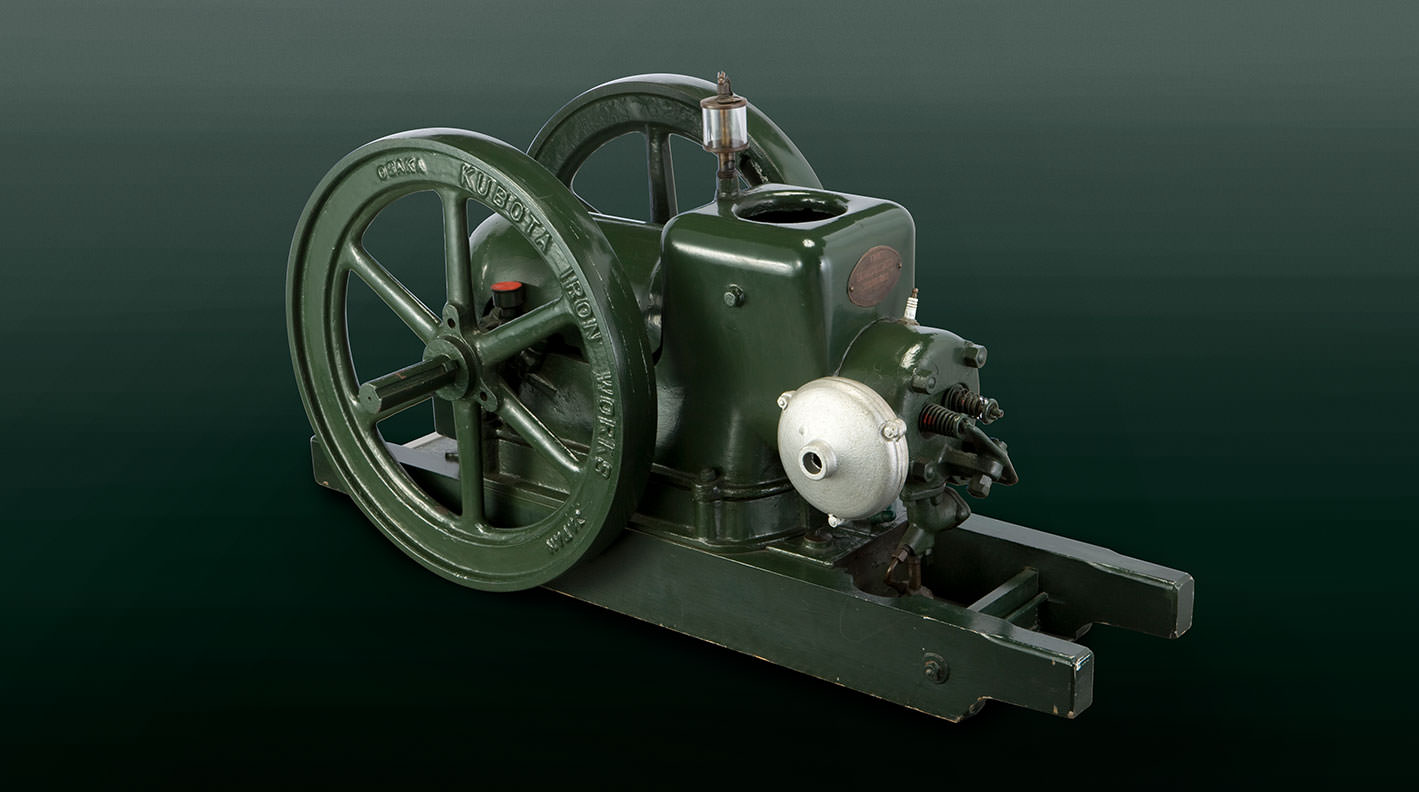Story
Why are Kubota Engines chosen all around the world?
Kubota engines, which were born from casting and mechanical technology, were later installed in Kubota's own agricultural and construction machinery, among similar devices, and also supplied to external industrial and machinery manufacturers. Now, Kubota is a leading company making general-purpose engines, especially small industrial diesel engines, and provides products and services around the world.
Let's explore the secrets of why Kubota started making engines, why our engines have become trusted by manufacturers around the world, and what kind of prospects Kubota has for the future.
-
The Eve of Foundation
Born in Ohama Village on Innoshima Island (present-day Ohama-cho, Innoshima, Onomichi City, Hiroshima Prefecture), Gonshiro Ohde came to Osaka at the age of 14, trained at a foundry, and founded Ohde Casting (the predecessor of Kubota) at the age of 19.Through hard work, trial and error, research and development, and innovation, the small ironworks started by Gonshiro eventually established itself as one of the leading manufacturers of iron pipes for waterworks in Japan.Why did Kubota, a manufacturer of iron pipes for waterworks, start making engines?Let's find out more about that story.
-
1922 -
Why Did Kubota Start Making Engines?
Having established itself as a manufacturer of iron pipes for waterworks and expanding its business, Kubota was looking for new opportunities. The company's automobile manufacturing business continued to stagnate and they were looking for a way to break out.Also, at that time, the post-WW1 recession combined with a drought took a heavy toll on both Japanese industry and agriculture.It was here that Kubota faced a major turning point.
-
1930 -
Encountering the Diesel Engine
In 1930, Kubota obtained manufacturing rights from the German company Bosch for seven models, ranging from 6 to 75 horsepower. These diesel engines were mainly used to power water pumps and sawmills, while high horsepower engines (50 hp or more) were used for ships.Kubota's encounter with the diesel engine would lead to further breakthroughs in the years to come.
-
1950 -
Postwar Reconstruction
Increases Demand for EnginesA few years following the end of World War II, the Japanese economy had recovered from the chaos and was entering an era of free competition. Engines were valuable because they were useful for increasing food production, which caused demand to explode.Kubota resumed manufacturing engines, which were the heart of Japanese industry.
-
1970 -
Evolving with Agriculture
In 1972, a global food crisis triggered a sharp increase in demand for agricultural machinery. In particular, demand for new tractors and combine harvesters was high, beginning the era of the “tractors and combine harvesters.”Kubota's agricultural machines enjoyed explosive popularity, but from an operability and reliability standpoint, it was the engine, the heart of the machine, which supported our success.
-
1980 - 1989
The Maturing Agricultural Machinery Market
The agricultural machinery market had matured with the popularization of tractors and combines. In addition, the second rice acreage reduction policy enacted by Japan's government encouraged crop conversion to wheat and soybeans, creating new needs for farm machinery.To meet the diverse demands of farmers, Kubota responded by expanding its engine lineup.
-
1990 - 2000
Strengthening Environmental Regulations
Pollution problems that arose with rapid economic growth became environmental protection challenges not only in Japan, but also on a global scale.As engine manufacturers responded to strict regulations, Kubota took the lead as an industry leader in addressing the issue for the sake of the Earth's future.
-
2001 -
Responding to Increasingly Stringent
Regulations and Diverse NeedsAs we enter the 21st century, environmental regulations for industrial engines are becoming even more stringent.For this, Kubota Engine has come to provide a full range of solutions to meet the diverse needs of industrial machinery manufacturers.
-
FUTURE
Kubota's Innovations Earn
Greater Worldwide AttentionOne of the reasons that Kubota engines are so well received is our collection of constantly evolving innovations.We believe that this is due to our forward-looking perspective with regard to product development, research, surveys, testing, manufacturing processes, compliance with environmental regulations, and other aspects of the market, global circumstances, and social issues.One major challenge is to achieve carbon neutrality. Kubota, which has been a leader in meeting environmental regulations in various regions around the world, will continue to work toward a sustainable society and finding solutions to social issues through further innovation.








